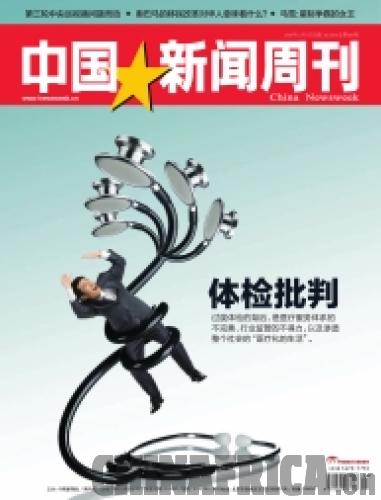| 
The More Not Necessarily the Better
China Newsweek
December 1, 2014
With the pressures of life and work mounting, an increasing number of Chinese are giving more and more importance to health checkups. During the past decade, people's investment in the medical checkup service made the industry thrive; however, it also created the problem of excessive medical tests.
China Newsweek magazine looks at the issue. The spending on medical checkup services had amounted to 60 billion yuan ($9.7 billion) by the end of 2013. Many experts believe regular checkups are necessary for those who have chronic diseases or work in hazardous industries, for example workers who are frequently exposed to dust. However, repeated checkups may prove harmful. Some experts warn that unnecessary medical tests are not only a waste of money, but may also have side effects like panic and false comfort. Besides, excessive X-rays and CT scans can be potentially harmful.

Driven by Design
Oriental Outlook
December 4, 2014
Why are people crazy about iPhones? The answer is that it is a successful industrial design, a term that can be interpreted as a process of combining art with technology to create a new product.
Oriental Outlook looks at the role of industrial design in upgrading the Chinese economy. It is a way to help Chinese manufacturing businesses improve their products' added value and strengthen the sector's competitiveness. Boosted by industrial design, the economy will be driven by innovation instead of labor resources. The rapid growth of the manufacturing sector during the past decades has laid a solid foundation for such designs. Manufacturing businesses also need better products to accelerate the pace of going global.
But the problem is that many small- and medium-sized enterprises know little about the importance of design and their intellectual property rights are poorly protected. The Chinese Government is now planning to set up national industrial design centers to help train professionals and create a favorable business environment to produce more designs.

Regional Integration
China Economic Weekly
December 8, 2014
In February 2014, Chinese President Xi Jinping called for integrated and coordinated development of neighboring cities of Beijing, Tianjin and Hebei Province. China Economic Weekly looks at what each region expects from this strategy and how to boost regional integration.
With the integration plan in place, Beijing will find cures to "urban diseases" such as traffic congestion, huge pollution and overburdened healthcare and education systems. Due to the trio's contiguity, the problems, pollution in particular, require joint efforts for resolution. For Hebei, which geographically circles the capital but generates a GDP per square km only about 10 percent of that of Beijing, it is an opportunity to absorb investments and take over some industries to boost the local economy. Tianjin targets at industries and functions complementary to Beijing.
Industrial integration doesn't mean merely moving factories from one place to another. Experts say each region's advantages should be fully used in the cooperation. Beijing should play its role in technological innovation better. It can then be applied to specific industries in Hebei.
Valuing Life
Qianjiang Evening News
December 10, 2014
A 19-year-old who killed himself online on November 30, 2014 attracted massive attention in cyberspace. Some netizens made efforts to save his life, whereas some criticized the teen's move as a ploy to grab attention. It finally proved to be a real tragedy with the teenager dying of an overdose of sleeping pills and excessive inhalation of carbon monoxide.
Education is important to avoid such tragedies in the future. Education makes people value their own life as well as respect others'. Fundamentally, it aims at strengthening people's, especially minors', ability to endure defeats and frustration.
The current education system should reform its philosophy and approach so that students are able to solve the real problems encountered in life with what they learn in school. With more problems resolved, people could gain better self-recognition and higher self-affirmation, which, in turn, would help them defuse crises in their lives. |